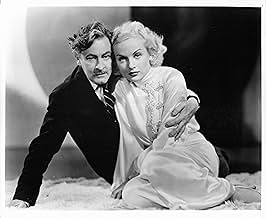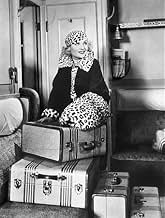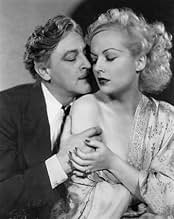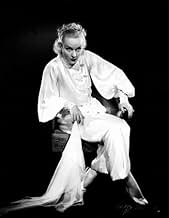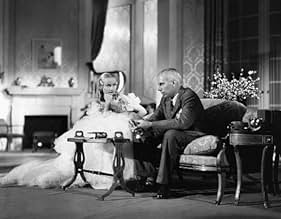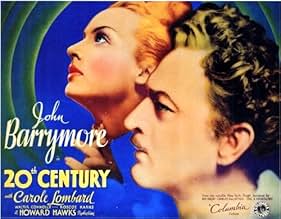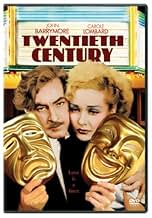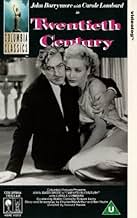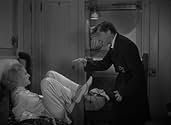CALIFICACIÓN DE IMDb
7.2/10
7.6 k
TU CALIFICACIÓN
Agrega una trama en tu idiomaA flamboyant Broadway impresario who has fallen on hard times tries to get his former lover, now a Hollywood diva, to return and resurrect his failing career.A flamboyant Broadway impresario who has fallen on hard times tries to get his former lover, now a Hollywood diva, to return and resurrect his failing career.A flamboyant Broadway impresario who has fallen on hard times tries to get his former lover, now a Hollywood diva, to return and resurrect his failing career.
- Dirección
- Guionistas
- Elenco
- Premios
- 4 premios ganados y 1 nominación en total
Charles Lane
- Max Jacobs
- (as Charles Levison)
Bobby Barber
- Sign Painter
- (sin créditos)
Herman Bing
- Beard #1
- (sin créditos)
Lynton Brent
- Train Secretary
- (sin créditos)
Anita Brown
- Black Stage Showgirl
- (sin créditos)
James Burke
- Sheriff
- (sin créditos)
James P. Burtis
- Train Conductor
- (sin créditos)
Eddy Chandler
- Cameraman
- (sin créditos)
Nick Copeland
- Treasurer
- (sin créditos)
Opiniones destacadas
If "The Lady With Red Hair" (about Mrs. Leslie Carter) gave us a good portrait of theatrical producer/director David Belasco (in the capable hands of Claude Rains), this film shows the ham side. Oscar Jaffe (John Barrymore) is based on Belasco, with his less attractive sides. Here is not the man who simply helped create proper modern stage production and rehearsal technique, but the egotistical side of him (the side Rains showed when he released all contacts to Leslie Carter -Miriam Hopkins in that film - when she dared to marry without his consent). Here Jaffe has created the actress sensation "Lily Garland" from an ambitious shop girl named Mildred Plotka (Carole Lombard). Jaffe has played a caring, fatherly Svengali to her, prodding her by caring, sweet, regretful terms to do what he wants (except they are rehearsing). But although - eventually - Lily is willing to become his lover, he is so jealous that he drives her to flee from him. He decides he can do it again, but falls on his face. She goes on to screen immortality in Hollywood. So he is forced to pull out all stops to get her back to a signed contract, when he learns she and he are traveling back to New York on the Twentieth Century train.
Howard Hawks would tackle farce several times in his career: "His Gal Friday", "I Was A Male War Bride", "Man's Favorite Sport" were all in the future. But this may have been the best of them. The other films have great choice moments, but this one is almost flawless from the start. Take the beginning when Jaffe brings the cast of his first play starring Lili. It is a piece of sentimental pap that Jaffe always produces (later on, before being dismissed by him, Charles Lane tells off Jaffe the truth that he produces hackwork and "gets away with it" because of Lili's talent). In fact, it is a spoof of a popular piece of melodrama from the late 1920s, "Coquette", which was turned into a film in 1929 (and netted Mary Pickford an Oscar, which she should have gotten for other films, such as "Sparrows"). The cast, including an African-American in a typical stereotype servant role of the period, have to go through several hours of rehearsing the first scene due to Mildred/Lily's failure to match Jaffe's exacting direction. What the overly controlling Jaffe does with stage blocking and a piece of chalk is a nightmare for anyone who has ever tried to produce or act in a play. He does, however, know about acting - he reminds Mildred/Lily that when she calls for "Daddy" in an old southern plantation house she is not to use a voice similar to calling "Taxi" in the street.
I won't go into the rest of the film, but wait for "the iron door" whose hinges get dingier and more rusted with each closing, or Barrymore's commentary on "the Passion Play". Lombard has a more subtle, reacting part, but she is Barrymore's equal partner, having the moment of reality at the center of the film: on the train, when after screaming at each other she breaks down and cries, and makes Jaffe realize that they have built themselves into an unhealthy universe where they can't be real people anymore. It's a brief, and touching moment - fortunately not destroying the sheer lovely nuttiness of the rest of the film.
Howard Hawks would tackle farce several times in his career: "His Gal Friday", "I Was A Male War Bride", "Man's Favorite Sport" were all in the future. But this may have been the best of them. The other films have great choice moments, but this one is almost flawless from the start. Take the beginning when Jaffe brings the cast of his first play starring Lili. It is a piece of sentimental pap that Jaffe always produces (later on, before being dismissed by him, Charles Lane tells off Jaffe the truth that he produces hackwork and "gets away with it" because of Lili's talent). In fact, it is a spoof of a popular piece of melodrama from the late 1920s, "Coquette", which was turned into a film in 1929 (and netted Mary Pickford an Oscar, which she should have gotten for other films, such as "Sparrows"). The cast, including an African-American in a typical stereotype servant role of the period, have to go through several hours of rehearsing the first scene due to Mildred/Lily's failure to match Jaffe's exacting direction. What the overly controlling Jaffe does with stage blocking and a piece of chalk is a nightmare for anyone who has ever tried to produce or act in a play. He does, however, know about acting - he reminds Mildred/Lily that when she calls for "Daddy" in an old southern plantation house she is not to use a voice similar to calling "Taxi" in the street.
I won't go into the rest of the film, but wait for "the iron door" whose hinges get dingier and more rusted with each closing, or Barrymore's commentary on "the Passion Play". Lombard has a more subtle, reacting part, but she is Barrymore's equal partner, having the moment of reality at the center of the film: on the train, when after screaming at each other she breaks down and cries, and makes Jaffe realize that they have built themselves into an unhealthy universe where they can't be real people anymore. It's a brief, and touching moment - fortunately not destroying the sheer lovely nuttiness of the rest of the film.
Completely over the top, silly but very funny, Twentieth Century makes the most of Carole Lombard and John Barrymore's comedic talents. This film marked the beginning of Lombard's fabulous career (tragically cut short in 1942) and the end of Barrymore's. They truly are two of the best performers that motion picture history has ever seen. I really envy Lombard's ability to laugh on cue, and Barrymore's ability to pull hilarious facial expressions.
Oscar Jaffe, (John Barrymore), a big time director, made Mildred Plotka now named Lily Garland a star, but HIS career is taking a battering after Lily packed up her life with him and on stage for Hollywood stardom. They accidentally meet on the Twentieth Century Limited and hilarity ensues! There is some fantastic physical comedy here and both Barrymore and Lombard are fantastic as the overly dramatic actor/director couple who are only real "from curtain to curtain". It's a great balance of drama/comedy.
My favourite part was definitely the start. I laughed out loud when Barrymore says "Dinga-linga-ling". After seeing him in Dinner at Eight (1933), I was surprised he had THIS much talent for comedy. Carole of course is her usual perfect self. I believe neither overshadows each other. I was very impressed with both of them. However, I have not forgotten the brilliant supporting cast, with the likes of Walter Connolly, Roscoe Karns and Ralph Forbes.
Twentieth Century is a classic screwball comedy which could please the harshest of critics. Dramatic, funny but in many ways climatic. I would have enjoyed it even it had been disappointing as all the fashions were absolutely divine! Wonderful to see Hollywood's greatest actors produce such fine work together. A classic through and through.
Oscar Jaffe, (John Barrymore), a big time director, made Mildred Plotka now named Lily Garland a star, but HIS career is taking a battering after Lily packed up her life with him and on stage for Hollywood stardom. They accidentally meet on the Twentieth Century Limited and hilarity ensues! There is some fantastic physical comedy here and both Barrymore and Lombard are fantastic as the overly dramatic actor/director couple who are only real "from curtain to curtain". It's a great balance of drama/comedy.
My favourite part was definitely the start. I laughed out loud when Barrymore says "Dinga-linga-ling". After seeing him in Dinner at Eight (1933), I was surprised he had THIS much talent for comedy. Carole of course is her usual perfect self. I believe neither overshadows each other. I was very impressed with both of them. However, I have not forgotten the brilliant supporting cast, with the likes of Walter Connolly, Roscoe Karns and Ralph Forbes.
Twentieth Century is a classic screwball comedy which could please the harshest of critics. Dramatic, funny but in many ways climatic. I would have enjoyed it even it had been disappointing as all the fashions were absolutely divine! Wonderful to see Hollywood's greatest actors produce such fine work together. A classic through and through.
John Barrymore is in rare form in Twentieth Century (1934), Howard Hawks's hilarious, fast-paced screwball comedy. He plays flamboyant Broadway director-producer Oscar Jaffe, a man for whom the whole world is truly a stage. The always enchanting Carole Lombard co-stars as Mildred Plotka/Lily Garland. (Oscar demanded the name change because Mildred Plotka isn't nearly as glamorous sounding as Lily Garland.) Mildred, an aspiring Broadway actress, is remade by Oscar into a star of the New York stage. For three years he directs her plays, guides her career, and is her lover. But after they have a big disagreement, she takes off for Hollywood. Her career soars; his plummets. Time passes and then on board the Twentieth Century heading for Grand Central Station, they meet again. As usual in a Hawks film, the supporting cast is outstanding; and Ben Hecht and Charles MacArthur's screenplay is one of their finest.
John Barrymore leads a great cast in this zany comedy of life in the theater. His performance alone is worth seeing as he proves what a gift he had for comedy. The rest of the cast is wonderful too. And if you disagree, I'll close the iron door on ya!
Funny and intelligent comedy features a brilliant performance by Barrymore, spoofing his earlier "Svengali" role. He looks and acts a lot like Peter Sellars would in later similar performances; now morose, then practically jumping with energy. Lombard also turns in a right-on performance.
Here is a film where Hawks really finds his mark, because the comedic action is perfectly timed, flows nicely, and feels natural, and even includes some early Hawks "overlapping dialogue".
Hardly a dull moment, miles above its peers.
Here is a film where Hawks really finds his mark, because the comedic action is perfectly timed, flows nicely, and feels natural, and even includes some early Hawks "overlapping dialogue".
Hardly a dull moment, miles above its peers.
¿Sabías que…?
- TriviaJohn Barrymore once said that the role of Oscar was "a role that comes once in a lifetime" and even deemed this his favorite of all the movies he appeared in.
- Errores(at around 20 mins) O'Malley arrives at Lily's apartment. When she answers the door, he discards his newspaper twice between shots.
- Citas
Oscar Jaffe: Go on, Owen... tell her I'm dying... and DON'T OVERACT!
- Versiones alternativasThere is an Italian edition of this film on DVD, distributed by DNA Srl. The film has been re-edited with the contribution of film historian Riccardo Cusin. This version is also available for streaming on some platforms.
- ConexionesFeatured in The Men Who Made the Movies: Howard Hawks (1973)
- Bandas sonorasHappy Days Are Here Again
(1929) (uncredited)
Music by Milton Ager
Lyrics by Jack Yellen
Sung a cappella by Walter Connolly
Selecciones populares
Inicia sesión para calificar y agrega a la lista de videos para obtener recomendaciones personalizadas
- How long is Twentieth Century?Con tecnología de Alexa
Detalles
Taquilla
- Total a nivel mundial
- USD 9,800
- Tiempo de ejecución1 hora 31 minutos
- Color
- Relación de aspecto
- 1.37 : 1
Contribuir a esta página
Sugiere una edición o agrega el contenido que falta

Principales brechas de datos
By what name was Twentieth Century (1934) officially released in India in English?
Responda

